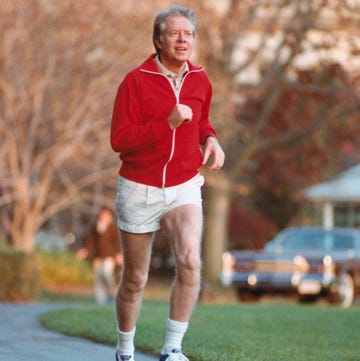At about the 10K mark of the Frankfurt Marathon on October 29, Lindsay Flanagan encountered every marathoner’s nightmare: gastrointestinal distress.
Safely tucked into a pace group of fellow racers, she did her best to ignore it. At mile 18, she finally had to duck into a porta potty.
Despite the estimated 20 seconds she lost, she finished fourth in a 2:29:28—a nearly four-minute personal best and a time that puts her fifth on the list of U.S. USATF to Elect New President Amid Budget Deficit. Shalane Flanagan. She ran 2:25:26 at the Olympic Games in Rio.
Though she’s frequently asked about her famous last name, Lindsay Flanagan, 25, sets the record straight: She shares no genes with 35-year-old Olympian.
After the race in Frankfurt, Flanagan met a man who, seeing her name, swore he’d shown her around Berlin the year before. “I was like, ‘That was Shalane, that wasn’t me,’” she said. “We’re no relation—but I aspire to be like her.”
The younger Flanagan’s ability to work her way back into the race post-potty without panicking shows she’s off to a good start—and exemplifies maturity beyond her years, said her coach, Isaya Okwiya.
At the University of Washington, Flanagan earned All-American honors in the 10,000 meters and finished fourth in the distance at the Pac-12 championships in 2014 despite losing a shoe halfway through.
After graduation, Flanagan moved to Silver Spring, Maryland, to train with Okwiya and a small group called Riadha. There, she runs on trails and towpaths with teammates who include fellow Mizuno-sponsored athletes Maegan Krifchin and Serena Burla. Flanagan calls 34-year-old Burla—a mother and cancer survivor—a mentor and inspiration. “She teaches me so much every day,” Flanagan said.
At age 23, Flanagan made an impressive 2:33:12 marathon debut, placing ninth in the January 2015 Houston Marathon. At the Pan American Games in Toronto in July of that year, she ran a 2:36:30 on a hilly course in hot, humid weather to win silver.
She faced similarly challenging weather at the Olympic Marathon Trials in Los Angeles in February. On a day in which temperatures topped out near 80 degrees, Flanagan accelerated with the lead pack early on, then paid the price. After stopping to get sick around mile 21, she finished 14th in 2:39:42.
Though the race fell short of her expectations, she said the experience drove her to work on fine-tuning her nutrition—and also had her seeking redemption.
“In the marathon you’re going to go through the lows, and the lows are going to be pretty bad,” she said. “But once you learn you are going to be able to get through that, that gives you confidence moving forward.”
Knowing she was capable of more, she and Okwiya chose Frankfurt for its flat course, generally good weather conditions, and fast performances. Flanagan felt confident heading in, thanks to successful marathon pace runs and mileage that topped out in the lower 90s. She rounded that out with swimming, ElliptiGO, and other cross-training workouts.
In fact, she hadn’t even planned on running a fall marathon—but once Okwiya saw how well her training was progressing, he suggested she give the distance another go sooner rather than later.
Though she isn’t necessarily done with shorter races (she also ran the 10,000 meters at the Olympic Track Trials, where she placed 18th in 34:17.25), Flanagan and Okwiya said her future lies in the marathon.
“If there was a gene that is the marathon gene, Lindsay probably has it,” Okwiya said. “Her approach to training and the patience she has learned to develop, all those are very important. She understands that she has to embrace the process.”
For now, Flanagan has no races on the calendar—she’s spending a few days touring Europe before heading back to discuss a potential spring marathon with Okwiya. In the meantime, she’ll make time to watch yet another fast Flanagan. Her sister Kaylee, now a sophomore at UW, will run the NCAA cross-country championships on November 19.

Cindy is a freelance health and fitness writer, author, and podcaster who’s contributed regularly to Runner’s World since 2013. She’s the coauthor of both Breakthrough Women’s Running: Dream Big and Train Smart and Rebound: Train Your Mind to Bounce Back Stronger from Sports Injuries, a book about the psychology of sports injury from Bloomsbury Sport. Cindy specializes in covering injury prevention and recovery, everyday athletes accomplishing extraordinary things, and the active community in her beloved Chicago, where winter forges deep bonds between those brave enough to train through it.













